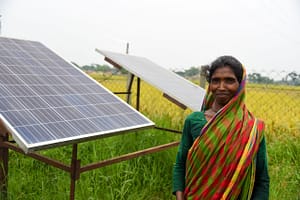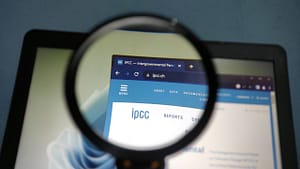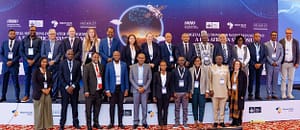by Cebolenkosi Zuma & Dr. Callist Tindimugaya
From the imposing hallways of Kenneth Kaunda International Conference Centre’s new block during the 3rd African Implementation and Partnership Conference, PANAFCON-3, which took place from 27 to 29 May 2025 in Lusaka, Zambia, the momentum around the Strategic Programme on Groundwater for Water Security and Resilience in Africa (SPGWR) has only grown stronger. The development of the strategic programme is led by the African Ministers’ Council on Water (AMCOW) with support from the Groundwater for aDvancing Resilience (G4DR) project, the Africa Groundwater Network and others. The programme has indeed come a long way since its inception.
It all began in Maseru, Lesotho, in late November 2024, where a group of groundwater experts and stakeholders met to brainstorm and build the foundation of the SPGWR Log frame, which would then guide the development of a broader, detailed programme document later. Inputs and suggestions from colleagues were positive and innovative, all centred on four strategic objectives that would shape the continent’s groundwater future:
- Strengthen the policy, legal and institutional environment, and practice for groundwater development, utilisation, and management towards resilient rural economies, sustainable urban centres, and overall quality livelihoods, as well as social security and protection.
- Support the development of multilevel human and institutional groundwater management capacity for water security and climate resilience.
- Build a business case to demonstrate structured investment’s economic value and cross-sectoral benefits in groundwater development and management.
- Develop and operationalise tools to raise awareness, support evidence-based decision making and catalyse political and stakeholder buy-in and ownership.
The discussions in Maseru, Lesotho, were instrumental in refining these objectives and aligning the SPGWR with Africa’s broader climate and development ambitions. The groundwork for a transformative continental programme was firmly laid, from enhancing climate resilience to driving socio-economic growth.
Taking the Strategic Programme to the Continent:
Building on this foundation, AMCOW established a task team composed of groundwater experts and practitioners from within Africa to brainstorm further and enhance the focus of the programme. Having developed a draft programme document, AMCOW took the SPGWR conversations across Africa through a series of regional consultations on the Africa Water Vision and Policy that brought the vision to life. These consultations ensured that the programme reflects regional priorities and realities, while anchoring its goals within Africa’s larger frameworks, including the draft Africa Water Vision 2063 and Policy and the African Union’s Agenda 2063. The message was clear at each consultation: the SPGWR is not just another plan, it is a continental call to transform how Africa manages and protects its groundwater reserves – ensuring this invisible yet indispensable resource is central to the continent’s water security agenda.

Figure 1: Participants after the Groundwater for Water Security and Resilience in Africa session, hosted by the Africa Groundwater Network (AGW-Net) and AMCOW at PANAFCON-3, Lusaka, Zambia. (photo credit: Dr Callist Tindimugaya)
The journey then brought the SPGWR to Lusaka, Zambia (Figure 1), where a dedicated side session at PANAFCON-3 provided a platform to enhance the programme with the outcomes of the lively and refreshingly candid discussion, which highlighted both progress and persistent challenges with groundwater.
Participants pointed out long-standing barriers – weak policy frameworks, limited understanding of aquifers and fragmented initiatives and investments. Yet, they also proposed actionable solutions: improving data systems, coordinating regional efforts, investing in human capacity, and strengthening governance structures. These themes aligned quite well with the strategic objectives of the SPGWR, particularly the need to raise groundwater’s profile at the political level, enhance institutional and human capacity, demonstrate its economic value, and strengthen policy and information systems. These discussions resonated strongly with the SPGWR’s four strategic objectives, demonstrating a shared vision to institutionalise smarter groundwater governance.
Towards Validation and Endorsement
As momentum around the SPGWR continued to build, the process reached a significant milestone with the Validation Workshop, held from 19 to 20 August 2025 in Nairobi, Kenya. This workshop concluded months of technical inputs, regional consultations, and stakeholder engagement. It offered a final opportunity for partners to review and refine the draft programme before its submission to AMCOW’s General Assembly.
The SPGWR was then tabled at the 14th Ordinary Session of the AMCOW Governing Council, held on 29 September 2025 in Dakar, Senegal, where Council members reaffirmed that the programme aligns squarely with the Africa Water Vision of “a water-secure and resilient Africa with safe sanitation for all.” The SPGWR was well received and formally adopted as a strategic framework to guide the continent’s inclusive and climate-resilient water security efforts through to 2063.
Where to from here: Charting the Course for Implementation
With the Council’s adoption marking the close of the initial development phase of the SPGWR, attention now turns to putting the plan into motion. The roadmap for action is clear, and the implementation of the next chapter is within reach.
The upcoming milestone will be the 39th Ordinary Session of the Assembly of Heads of State and Government of the African Union, scheduled for February 2026, where the SPGWR is expected to be endorsed, as part of the Africa Water Vision 2063 and Policy, and part of a continental implementation framework for Agenda 2063.
The journey ahead will require focus and determination. It will need sustained political will and support, innovative financing, strengthened governance, and an unwavering commitment to equitable access. Above all, it underscores the need to invest in people- their capacity, knowledge, and leadership. By prioritising data-driven decision-making, aligning and streamlining policies, fostering cross-sectoral partnerships, and translating strategic visions into tangible local impacts, Africa will not be merely responding to its water challenges; it will be actively shaping its future.









